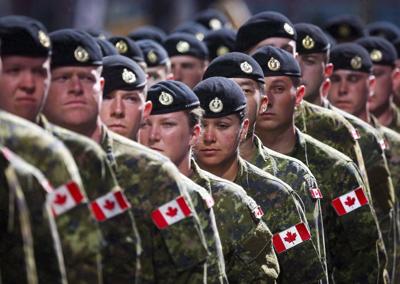Would you go to war for your country?
As Canada works to ramp up its defence spending after pledging to hit NATO targets, a new suggests nearly half of Canadians are willing to volunteer for a combat roleÌý— although most respondents said they would only enlist if they “agreed with the reasons for fighting.”
The results accompany a recent surge of interest in the Canadian military, with the armed forces reporting a Ìý— an improvement afterÌýyears of recruitment and retention problemsÌýin the Canadian military.
Public sentiment around Canada’s defence spending is shifting, driven in part by U.S. President Donald Trump’s annexationist rhetoric toward Canada, notedÌýShachi Kurl, president of the Angus Reid Institute.
Canada’s military is facing a series of problems that without a serious infusion of cash and attention from the federal government could threaten
Canada’s military is facing a series of problems that without a serious infusion of cash and attention from the federal government could threaten
“We’re at a 30-year high in willingness to spend on defence, security and military readiness,” she said. “These are numbers we haven’t seen in decades, in part because of the new reality we’re in with Donald Trump.”
Younger people and women less willing to volunteer for combat
While the report found 49 per cent of all respondents were willing to volunteer for a combat role in the event of an armed conflict, those aged 18 to 34Ìý— the demographicÌýlikely neededÌýto fill recruitment gapsÌý— were the least likely to want to enlist.
In this age range, a total 55 per cent of men and 31 per cent of women were willing to fight for their country. Meanwhile, 63 per cent of males aged 35 to 54Ìýsaid they would volunteer, and 34 per cent of females in this age range agreed.
Canadians aged 55 and older were most willing to volunteer if needed, with 69 per cent of men and 42 per cent of women saying they would enlist.ÌýBut the report noted their enthusiasm is unlikely to fill the recruitment hole, as the .
Canada aims to grow its military to 71,500 regular members over the next eight years by addressing long-standing recruitment and retention
Canada aims to grow its military to 71,500 regular members over the next eight years by addressing long-standing recruitment and retention
Kurl noted that, while this poses a “recruiting challenge,” it may also present an opportunity: “I think the armed forces themselves, in terms of recruitment, are gonna have to be quite creative about the skill sets they’re looking for, the experience they’re look for, et cetera.
“We also see the significant gender divide there,Ìýat a time when the armed forces are trying to be more inclusive, trying to present themselves as an institution with doors open, because they need those recruits …Ìýalthough younger men are also not thrilled at the prospect of combat based on these data,” she added.
Of the people willing to volunteer for combat, more than 60 per cent said they’d only do so if they agreed with the reasons for fighting, the survey found. Still, more people were willing to fight than not; 39 per cent of all respondents said they would not volunteer, while 12 per cent were not sure.
Of the major political parties, recentÌýConservative voters were most willing to volunteer for a combat role. A slim majority of NDP and BlocÌýQuébécois votersÌýsaid they’d decline to volunteer, while those who voted for Prime Minister Mark Carney’s Liberals last election were most dividedÌý— 41 per cent said they would not volunteer, while 47 per cent said they would.
Pride and conflict
The survey suggested those with more national pride were also among the most likely to be willing to enlist, and suggested that instilling pride could be a key to solving the military’s recruitment issues.
After Trump entered office, Canadian national prideÌý— which has deteriorated over the last few yearsÌý— took a sharp turn upwards. But just because Canadians are feeling prouder of their country doesn’t mean they feel the same about their military.
OTTAWA - Terror charges laid against members of the Canadian Armed Forces over an alleged plot to form an anti-government militia show the mil…
OTTAWA - Terror charges laid against members of the Canadian Armed Forces over an alleged plot to form an anti-government militia show the mil…
The number of people who saidÌýthey “feel proud when I think of Canada’s Armed Forces” has declined in the last six years, going from 79 per cent near the end of 2019 to 52 per cent last month.Ìý
It may be a consequence of recent scandalsÌýthat rocked the Canadian military, from theÌýhigh-profile sexual misconduct scandal in 2021Ìýto more recent reports of extremism in the armed forces.
“I’m not painting the entire institution with the brush of the actions of a few, but it’s not the first time we’ve heard about and been presented with challenges within the ranks of the armed forces in terms of extremist views,” Kurl said.
What if your child wanted to join the military?
While parents were less likely to be “excited” if their child were to join the military, more people than not said they’d be “supportive” of their choice.
Slightly more parents said they’d be “excited” or “supportive” if their daughter were to enlist compared to their son. Older Canadians and men were most likely to be either “excited” or “supportive” if their child wished to enlist, the survey suggested.
The Angus Reid Institute conducted the online survey from June 20 to 23, among a randomized, representative sample of 1,619 Canadian adults who are members of Angus Reid Forum. AÌýprobability sample of this size would carry a margin of error of +/- 2.0 percentage points, 19 times out of 20. The survey was self-commissioned and paid for by the Angus Reid Institute.






























To join the conversation set a first and last name in your user profile.
Sign in or register for free to join the Conversation